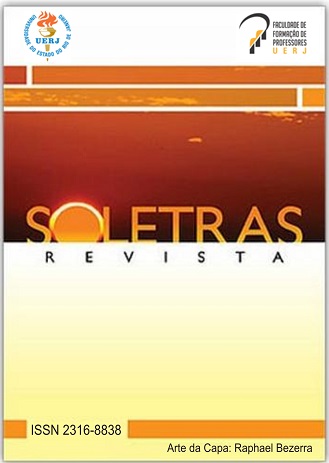Multiple interpretations of minds in the translation of David Almond’s Skellig
DOI:
https://doi.org/10.12957/soletras.2024.84816Resumo
The present article addresses the translation of young adult literature from a cognitive literary lens, aiming to investigate how multiple interpretations are prompted by literature and whether translational choices point to a translator’s attitude. It associates the concepts of narration and focalisation with the resources used by readers to construct a mental model of characters’ minds. It is argued that different narration and focalisation strategies pose different demands on readers’ theory of mind, the system of inferences used to interpret people’s mental states. In addition, it relates translational choices to an implied translator’s image of her readership and source text, employing the concepts of translator’s voice and positioning. That is exemplified through and analysis of the translation into Brazilian Portuguese of David Almond’s Skellig, focusing on three passages in which young characters interact. By doing so, the article not only shows how literature stimulates cognitive development, but also challenges the idea that literature for young readers is deprived of literary value and provides only literal readings, and purports that the translator’s attitude conditions whether translational choices convey a meaning-restrictive or -expanding idea of children’s and young adult literature.
Downloads
Publicado
Edição
Seção
Licença
A aprovação dos artigos implica a cessão imediata e sem ônus dos direitos de publicação nesta revista. O(s) autor(es) autoriza(m) ao Programa de Pós-graduação em Letras e Linguística (PPLIN) a reproduzi-lo e publicá-lo na revista SOLETRAS, entendendo-se os termos “reprodução” e “publicação” conforme definição do artigo 5° da Lei 9610/98. O(s) autor(es) continuará(rão) a ter os direitos autorais para publicações posteriores. O artigo poderá ser acessado pela rede mundial de computadores (http://www.e-publicacoes.uerj.br/index.php/soletras), sendo permitidas, a título gratuito, a consulta e a reprodução de exemplar do artigo para uso próprio de quem o consulta. Casos de plágio ou quaisquer ilegalidades nos textos apresentados são de inteira responsabilidade de seus autores.



